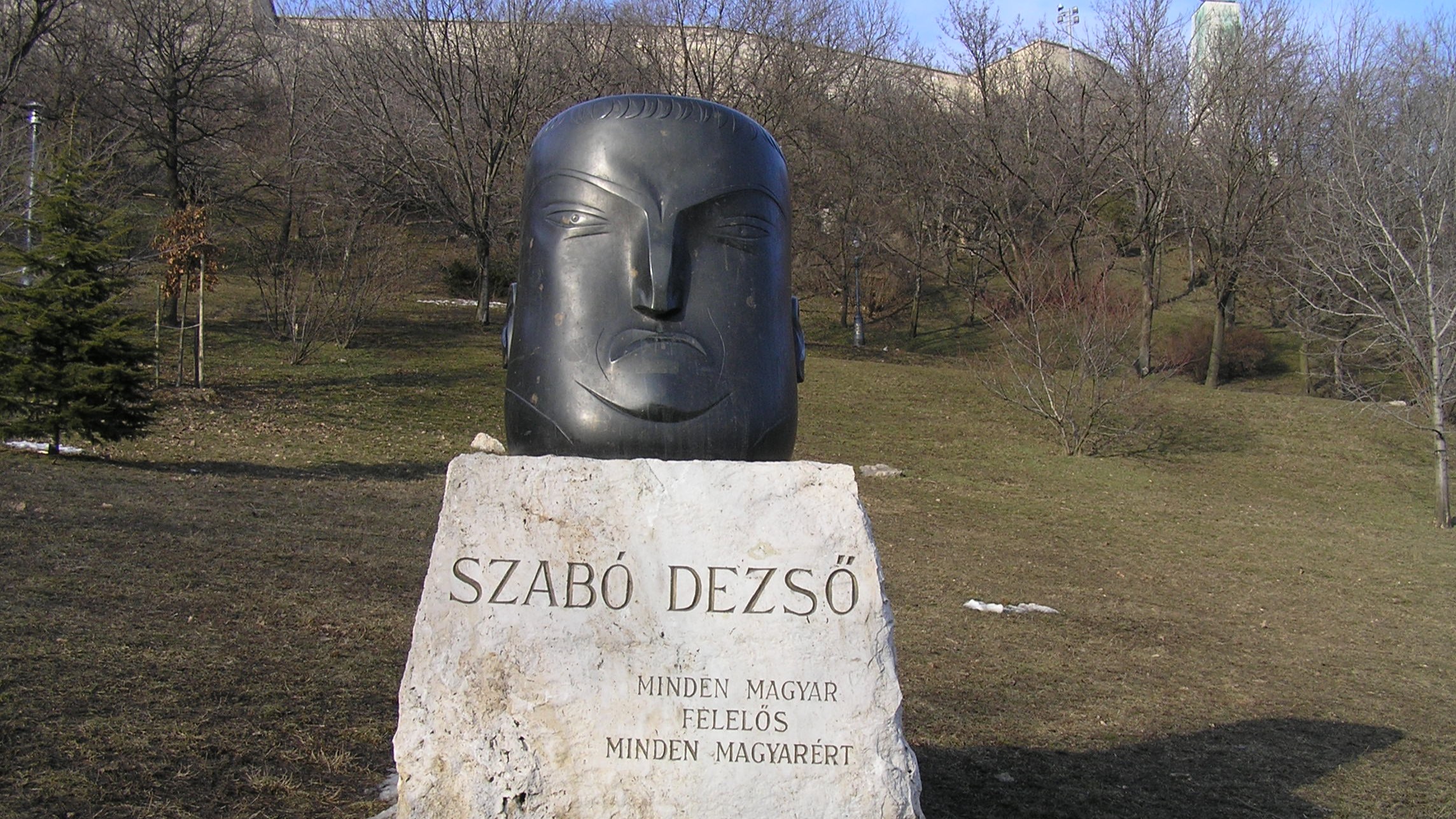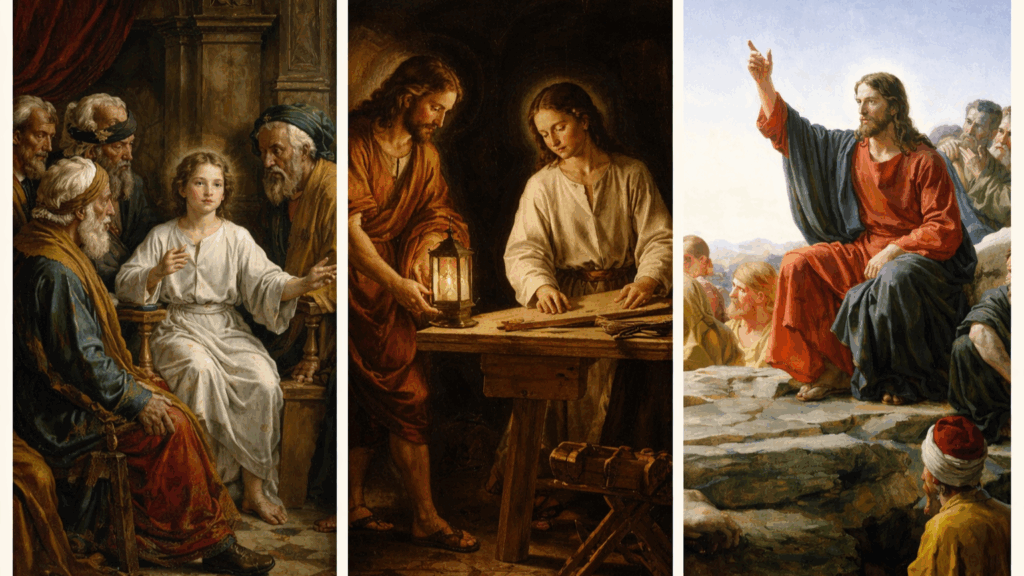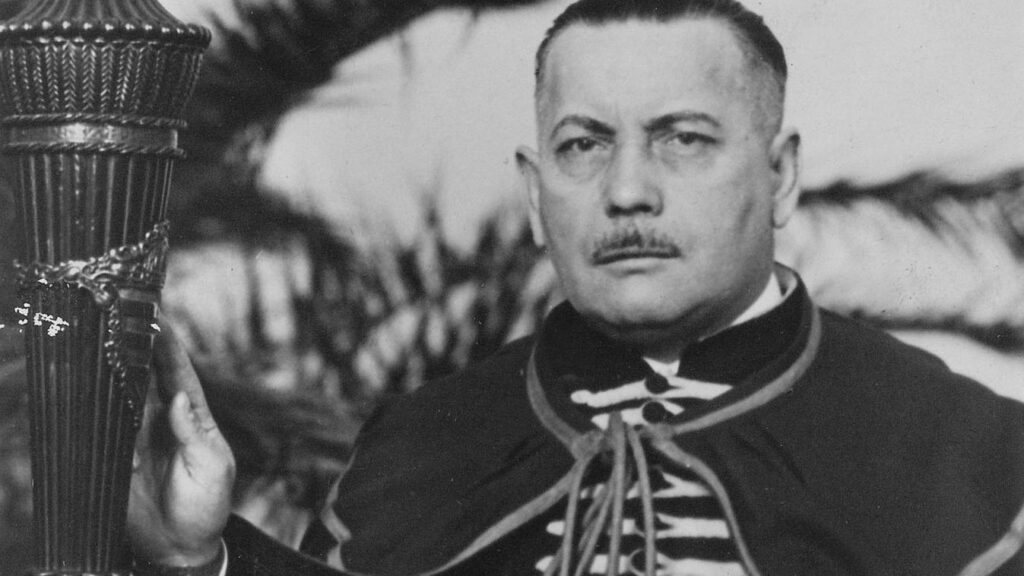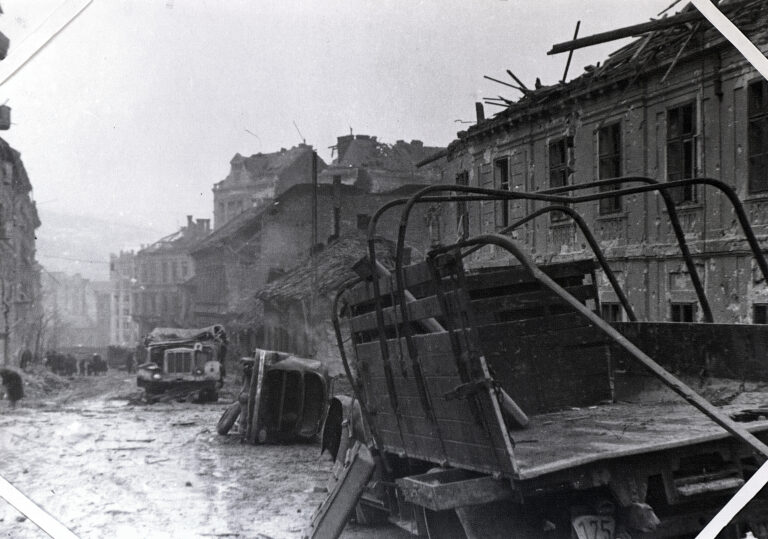The early Horthy regime’s antisemitism was quite diverse, and its various features would each merit a separate analysis. However, this time I will only focus on one specific, perhaps less discussed characteristic of early 20th-century Hungarian antisemitism, a representative of which was Dezső Szabó, a népi (‘populist’) writer, who died on 13 January 1945. Once a Christian socialist, then a communist, later a racialist antisemite, Szabó eventually became a critic of the Arrow Cross. The type of antisemitism in question is not about anti-capitalism or anti-communism, nor is it about anti-urbanism or anti-Judaism. It is a rather complex and peculiar approach to antisemitism: it is the ‘envy’ of the perceived racial consciousness and strong national character of the Jews, which can essentially be summarized as: ‘Yes, the Jews are a dangerous, cohesive race, but why aren’t we like them?’
This envy manifested itself in several forms after WWI. Harry Hill Bandholtz, an American general and diplomat much revered in Hungary, was shocked in 1919 to discover that when he referred to Hungarians as a ‘martyr nation’, the press welcomed the term with enthusiasm.[1] This expression had earlier been used by Theodor Herzl for the Jewish people.[2] (Of course, the appropriation of the martyr role became an international phenomenon after the Holocaust.) However, the examples do not end there. István Sréter—who until December 1920 served as Minister of Defence under Pál Teleki, and later became the Grand Captain of the Order of Vitéz—spoke of the fact that ‘we Hungarians are the chosen people of the Hungarian God’.[3] János Zakar, a far-right figure from Sarkad, wrote in a 1921 letter that ‘we are the true Israelites.’[4]
The concept of Jewish chosenness is primarily appropriated today by black antisemites in the United States, but similar views were also embraced during the entire Horthy era. In his 1920 book, Endre Zsilinszky (who later became an anti-Nazi resistance fighter, adopting the surname Bajcsy-Zsilinszky) stated: ‘We must learn from the Jews, and just as Jacob once wrestled with Jehovah, we too will wrestle with the Lord until He blesses us!’[5] Similarly, in the mid-1920s, he encouraged those mourning the Treaty of Trianon by saying that the Jews became a strong people during the Babylonian exile, and ‘this is our Hungarian Babylonian exile.’[6] Bishop László Ravasz, in a Reformed educational material at the end of the 1930s, wrote about the Hungarian people: ‘They are the rose that grew up in the desert, of which the prophecy speaks,’[7] elegantly skipping over the detail that the prophet Isaiah wrote this in reference to the resurrection of Zion.
This form of antisemitism did not escape the attention of the Jewish press. When representative Nándor Bernolák—who was responsible for the introduction of the numerus clausus racial quota against Hungarian Jews—suggested in 1921 that the Hungarian people should learn the love of family from the Jews for racial preservation purposes, the Jewish newspaper Egyenlőség (‘Equality’) wrote: ‘We have wondered at many variations of antisemitism in recent times, but this one still surprises us.’ The paper described this line of thinking as the ‘hate it because it’s good’ type of prejudice.[8]
‘Few things better illustrate the antisemitic recycling of certain Jewish concepts than the quote “Every Hungarian is responsible for every Hungarian.”’
No one, however, cultivated this kind of antisemitism more actively than Dezső Szabó. His books are full of Jewish characters—such as in The Village That Was Swept Away (Elsodort falu)—who, although written as rather unlikeable, are still admired by the narrator for their selfishness, strength, resourcefulness, and ‘love of their race’. Interestingly, this same ‘envy’ also appeared in Zionist literature, initially toward the non-Jewish peoples of the diaspora—one only needs to read Károly Pap’s short story ‘Blood’ (‘Vér’) published in the Hungarian literary journal Nyugat (West) in 1933[9],—and later toward the Arabs—see Vladimir Ze’ev Jabotinsky’s short story Samson on this topic.[10] Szabó described these Jewish characters with envy; clearly not with affection, but with a certain degree of admiration. The writer himself clarified in 1919 that ‘we’, that is, far-right writers, ‘want to be the Jews of the Hungarian nation.’[11]
Few things better illustrate the antisemitic recycling of certain Jewish concepts than the quote attributed to Dezső Szabó, ‘Every Hungarian is responsible for every Hungarian.’ Of course, a reader with some knowledge of Jewish tradition will immediately recognize the Talmudic origin of this quote: ‘kol Yisrael arevim zeh bazeh’ (‘כל ישראל ערבים זה בזה’), which means ‘All of Israel are responsible for one another,’ or in a free translation, ‘Every Jew is responsible for every other Jew.’[12] The Talmudic phrase, of course, predates Szabó Dezső by a long time.
Could it be that Szabó Dezső ‘stole’ a quote from Judaism and used it for his own purposes? This would not be surprising coming from him, as he was known for being provocative; once, for example, he announced that he was going to be a Romanian writer and move to Romania (of course, he didn’t do this, he simply wanted to provoke the press).
The quote is indeed important in today’s Hungary. It was primarily brought back into political discourse by István Csurka,[13] and since then, it has been used by the Hungarian government and left-wing Mayor Gergely Karácsony as well.[14] A few years ago, HVG reprimanded Tamás Menczer precisely because he did not cite Szabó Dezső as the source. But did Szabó Dezső really say this?[15] And even if indeed he did, did he say it this way, and is he the original source?
According to Arcanum, the quote first appeared in the Calvinist journal Sárospataki Református Lapok that reported on a spring 1938 speech by István Harsányi, a high school teacher. The essence of the speech was that Christian Hungarian youth needed to become merchants, because business had been ‘taken away from us by elements foreign in body and soul. Therefore, let us carry out our work with a holy responsibility towards one another. Every Hungarian is responsible for every other Hungarian!’[16] The quote thus served exactly the purpose we suspected: without explicitly stating it, Harsányi accused the Jews of having taken trade away from the Hungarians and suggested that it be reclaimed with a kind of ‘holy’ selfishness. The only problem is that he did not cite Szabó.
A few months later, Menyhért Simon wrote the same lines in the Kárpáti Magyar Hírlap newspaper. It is a phrase-laden, pompous text, of interest only in connection with the question as to where the author may have read the sentence.[17] In February 1939, Andor Jaross—who later became one of the main persecutors of Hungarian Jewry—mentioned in a speech that when he was a politician in today’s Southern Slovakia, he felt ‘that we are responsible for every Hungarian.’[18] Interestingly, the first source that attributes the quote to Dezső Szabó seems to be the June 1939 issue of the Transylvanian youth journal Ifjú Erdély. In an article titled ‘Szabó Dezső és az ifjúság’ (‘Dezső Szabó and the Youth’) by Sándor Bereczky, it is written that ‘he established in his system of thought…the most beautiful and sacred foundational truths of future Hungarian communal life: “Every Hungarian is responsible for every Hungarian,” and “every Hungarian man is the father of every Hungarian child.”’[19] At this point, we might think we are closer to the answer, as we now have the quote, and it’s clear that Szabó didn’t use it first. But in reality, the source raises more questions than it answers.
‘Szabó laments that ‘transcendent selfishness, as a way of life and faith, has disappeared from the Hungarian nation’
First of all, the two quotes do not come from the same source. The latter, somewhat odd sentence is found in Szabó’s 1935 writing ‘Mit adott nekem a magyar kálvinizmus?’ (‘What Has Hungarian Calvinism Given Me?’).[20] The date could suggest that Harsányi adopted the thought from Szabó. However, this essay does not include the line we are looking for. In his 2011 compilation, Zoltán Szőcs, a researcher of Szabó, attributes the first occurrence of the quote ‘every Hungarian is responsible’ etc to Szabó’s 1940 essay A bánya mélye felé (Towards the Depths of the Mine).[21] The line does indeed appear in this work, but as a question. The author laments that ‘transcendent selfishness, as a way of life and faith, has disappeared from the Hungarian nation,’ and states that ‘foreign life forms, foreign interests have deeply corrupted Hungarian selfishness.’ He then asks: ‘When will the highest instinct of every Hungarian soul, the principle of our survival, the foundation of our material and spiritual renewal, become: every Hungarian is responsible for every Hungarian?’[22] The context seems to support our argument: here, Szabó criticizes the dominance of a foreign group (the Jews) over the Hungarian nation and laments the lack of Hungarian selfishness, which he even gives a religious (transcendent) character. The sentence is, in fact, a call to action: when will the Hungarian people finally become like this?
But this cannot be the first mention, since the quote was already cited from Szabó in 1939. The compilation by Szőcs provides another clue: that Szabó also referred to the same idea in a 1943 speech, which remained in manuscript form, so it seems there were (and could still be) unpublished texts, lectures, where the quote appeared. It is possible that Szabó had been repeating the idea since 1938. According to our current knowledge, he first wrote it down in 1940, but the thought could indeed have originated from him. Overall, it is very likely—though not definitively proven yet—that the Dezső Szabó quote, which has now become widespread across the full political spectrum of Hungarian public life, is essentially a ‘borrowed’ Talmudic quote.
[1] Harry Hill Bandholtz, Napló nem diplomata módra. Román megszállás Magyarországon, Budapest, Magyar Világ, 1993, 166.
[2] Chaim Bloch, ‘Herzl’s First Years of Struggle. Unknown Episodes and Personal Recollections’, Herzl Year Book, 1960, 89.
[3] Iratok az ellenforradalom történetéhez. I. vol. Az ellenforradalom hatalomrajutása és rémuralma Magyarországon, Ed. Nemes Dezső, Budapest, Szikra, 1953, 173.
[4] Private papers of István Lendvai, Zakar to Lendvai, 19 January 1921.
[5] Zsilinszky Endre, Nemzeti újjászületés és sajtó, Budapest, Táltos, 1920, 115.
[6] Pritz Pál, ‘A fajvédők külpolitikai nézetei (1918–1936)’, Századok, 1990/1–2, 658.
[7] Bucsay Mihály, A protestantizmus története Magyarországon, 1521–1945, Budapest, Gondolat, 1985, 239.
[8] Egyenlőség, 28 May 1921, 8.
[9] https://epa.oszk.hu/00000/00022/00566/17681.htm
[10] Vladimir Jabotinsky, Prelude to Delilah, B Ackerman, New York, 1945.
[11] Téglás János, A vádlott: Babits Mihály. Dokumentumok, 1915–1920, Budapest, Universitas, 1996, 200.
[12] Talmud Bavli, Shevuot 39a.
[13] Érd, 12 February 1993, 5.
[14] See https://kormany.hu/hirek/minden-magyar-felelos-minden-magyarert1, http://2010-2015.miniszterelnok.hu/cikk/minden_magyar_felel_337_s_minden_magyarert and https://www.facebook.com/karacsonygergely/photos/minden-magyar-felelős-minden-magyarért-írta-annak-idején-szabó-dezső-és-bár-sok-/1937709169595253/
[15] https://hvg.hu/elet/20221007_Menczer_plagium_SzaboDezso
[16] Sárospataki Református Lapok, 20 March 1938, 53.
[17] Kárpáti Magyar Hírlap, 21 October 1938, 3.
[18] Békésmegyei Hírlap, 8 February 1939, 6.
[19] Ifjú Erdély, 1 June 1939, 114.
[20] Szabó Dezső füzetek, No 10, Ludas Mátyás kiadás, Budapest, 1935, 40. I thank historian Dávid Kovács for calling my attention to this.
[21] Szabó Dezső-enciklopédia, Ed Szőcs Zoltán, Budapest, Kairosz, 2011, 198.
[22] Szabó Dezső füzetek, No 59, Ludas Mátyás kiadás, Budapest, 1940, 30–31.
Read more from the author:







